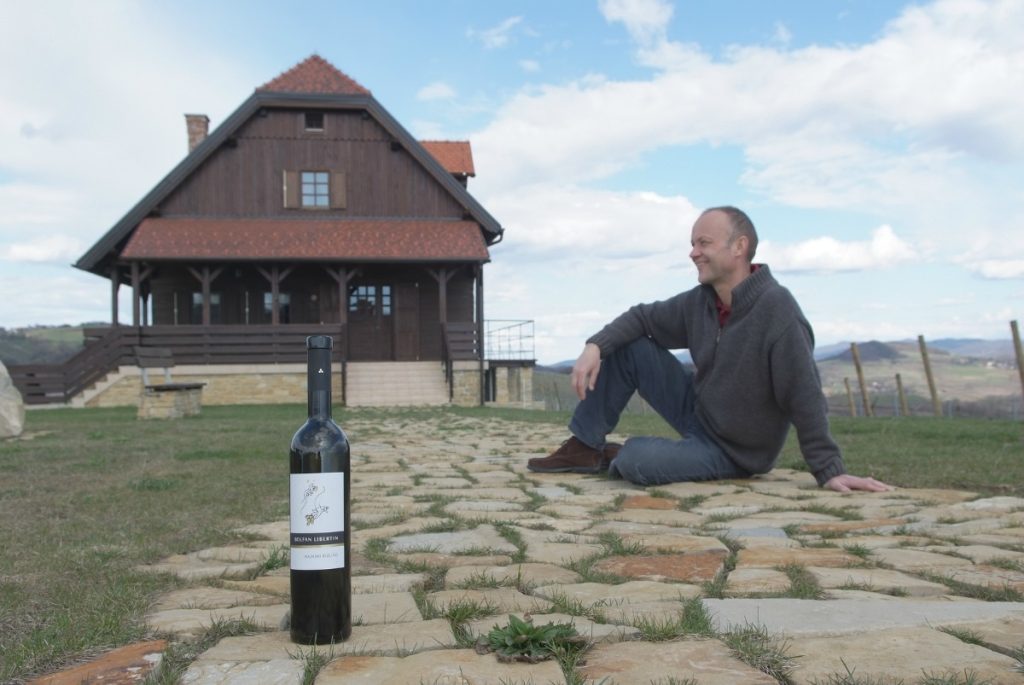All of the interviews in the series are going to be similar, with 8 same questions and 2 questions tailored specifically for each winemaker (those two will be easy to spot, as they will be coloured differently).
Could you please introduce yourself, your winery, your wines for our readers. How did you get into winemaking, and can you tell us a bit about your ethos of making wine?
We believe in the development of the wine production in our own vineyards, making sure that everything is ecological and in accordance with the natural laws and the tradition of agricultural production, which is the basis for human life. That manner is in the best interest of the development of the local community and our region, as it includes the positive relationship with the surroundings, first of all towards the people around us since it created jobs, then towards the nature it maintains and towards the local community it develops.
How was the last harvest in your vineyards? What do you expect of the 2016 wines? Do you have any specific expectations, plans or hopes for this vintage?
It was an really excellent harvest, and all went according to our plans.
We plan to make a new wine from the grapes of this harvest, and call it “Temper” – as the sensation of density, concentration and seriousness.
What are the Croatian wines (up to three whites and three reds) you think everyone should buy and taste at least once (not including any of yours, please)? Why?
Wow, you got me there, since I really think that there’s no such thing – that’s why each year we have wine festivals, because the wine changes and we need to find what’s optimal at that moment and at that occasion, because the wine depends on the mood, where it’s being drunk, why you’re drinking it, when you’re drinking it…
And, eventually, the wine from the same series of bottles will change every few months. Wine is alive and CHANGES, just like a man does.
Can the wine industry function separate from the tourism?
Your family farm and wine cellar get excellent reviews on tourist web-sites, you are well known as a tourist destination, and your wines are an integral part of the “product” you offer. Can you imagine your wines and your business being as successful without the tourist and hospitality aspect?
Well, it could, but I decided to go this way, along the tourism.
Unfortunately, that is not done well enough, in the marketing sense, I mean. Croatia would be able to prosper better from our tourism if we marketed it as a country – oeno-gastro destination. We could try and market it as the COUNTRY of WINE, food, sun, salt and sea.
What do you think about the situation in the Croatian winemaking these days? What would you change if you could, regarding the legislation, the market or anything else? Would you agree with the idea that Croatian wines are too expensive, which is something you can often hear?
We finally need to bring forward simple rules on determining the visual identity to the cork of each bottle, and replacing the existing tax stamp with a BRAND stamp, which has been created and well accepted by the winemakers years ago, but… It is happening (or not happening) according to the old Croatian principle of “let the neighbour’s cow get sick…”
The Croatian wines are not expensive, rather the paychecks are small, the taxes are too high, the politics of wine import are not effective and at the same time do not provide any protection of the interests of people in Croatia.
How do you see the relationship between the Croatian restaurants and the winemakers? Do Croatian restaurants promote and appreciate Croatian wines as much as they should, how do their margins affect the sale of Croatian wines?
I don’t think it’s true that the margins in Croatian restaurants are too high, that is something that happens in rare situations but generally that’s not the case. The problem lies in the high taxes and unreasonable conditions for business for restaurants. Those conditions are stricter and unnecessarily harsh compared to the most developed countries, and that reflects on the entrepreneurship in general and that’s why the restaurants have lower number of customers. And when the traffic is lower, it’s only logical that the prices will be higher.
You are very proud of the biodynamical aspect of your viticulture.
Can you explain to us what those “biodynamical principles” mean when making wine, for yourself as the winemaker, but also for your customer, wine-lover? Can you taste the biodynamics in the glass of wine?
Biodynamic means:
In accordance with the laws of nature, local interests, interests of the people and their health.
What do you think about the future of wine-making in Croatia, strategically how should it advance? Should we attempt exporting more Croatian wines? Can you comment on the changes which happened after our accession to the EU, specifically weigh in on the benefits of a larger market for export vs. the dangers of easier import of cheaper wines?
I don’t think that anything has changed when we entered the EU, the markets are just as closed as they were before. However, the wineries have received a financial injection and some investments. The overall world policies of the distribution of good and beverages and the interests of the global corporations suffocates the markets, destroying the quality and the nature along the way.
Do you think new vineyards in Croatia should be mostly indigenous varieties, or should more international wines be planted?
Each region and each winery need to make that decision on their own, based on their politics of production and their markets.
Paint us a picture of a perfect setting for enjoying a bottle of your wine. Which bottle did you choose, why?
My wine? Well, I would probably recommend a Sauvignon from 2015 or 2016 in a relaxing atmosphere, paired with fish-vegetable delicacies, or a Riesling Primus 2015 in the moments of evening contemplation.
Previously in the series of interviews:
Tomislav Tomac
Frano Baničević
Rikard Petrić











